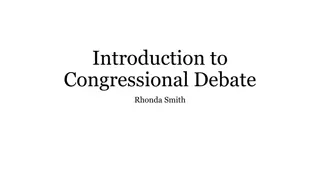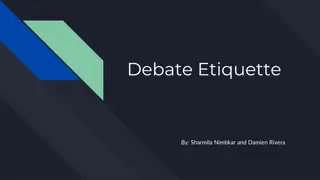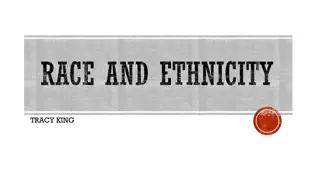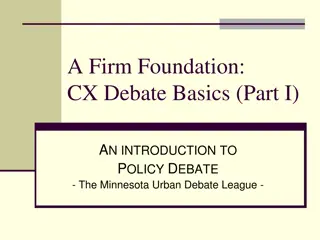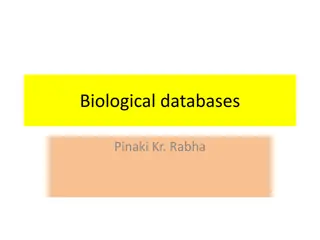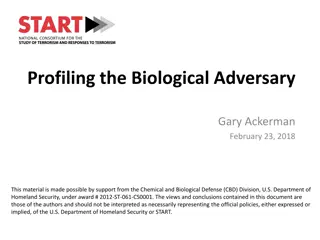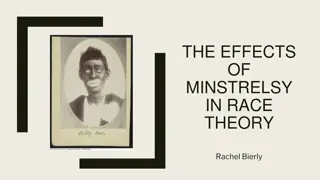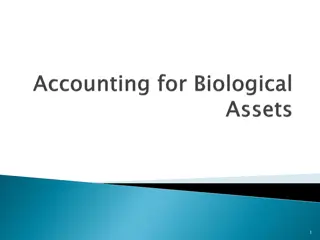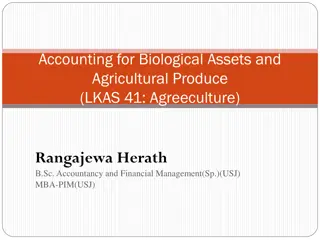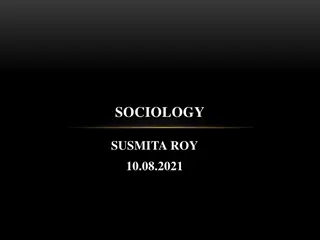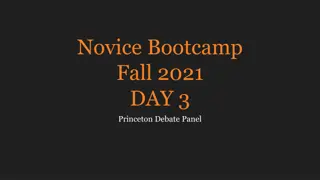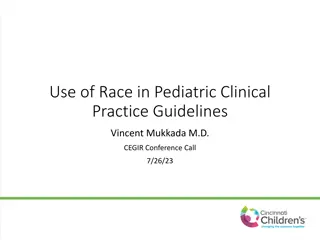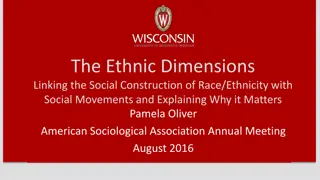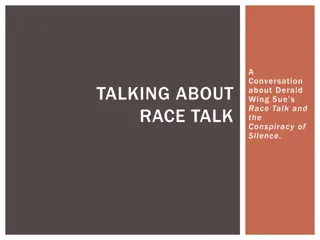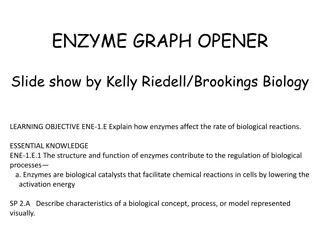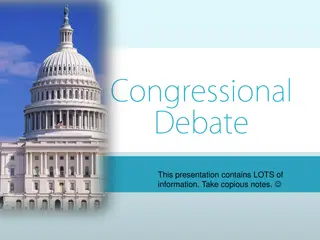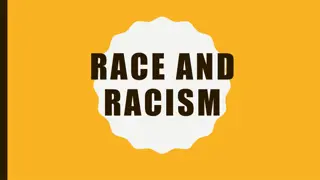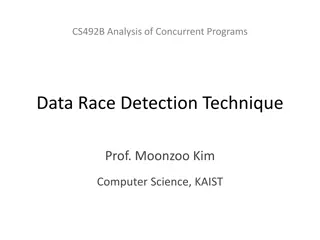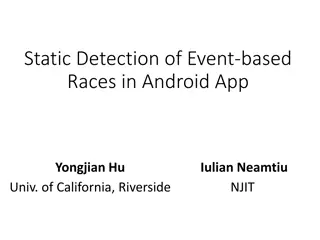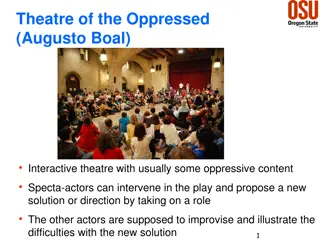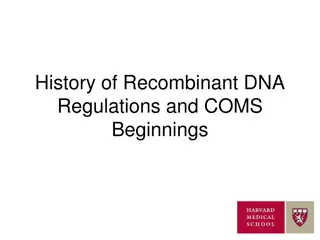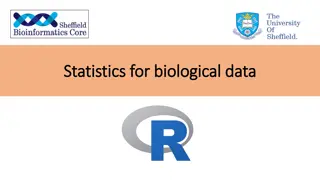Exploring Famous Races and Sporting Events in Bahrain
Immerse yourself in the world of sports with a lesson focused on famous races and events in Bahrain. Enhance your reading, listening, and writing skills as you learn about the Flat Race, Endurance Race, IronKids, and Formula1 Race. Discover key details about these events through engaging activities
5 views • 17 slides
The Great Apprenticeship Debate: For or Against Apprenticeships
The lesson involves a debate on the merits of apprenticeships, with arguments for and against discussed. Students are encouraged to consider factors such as cost, time commitment, social life, workplace experience, and more. Debate rules emphasize the importance of using evidence, respecting others,
2 views • 7 slides
Essentials of Congressional Debate: Rules, Procedures, and Norms
Explore the key components of Congressional Debate including the types of legislation, preparation guidelines, contest norms, and dress code expectations. Learn about bills, resolutions, and constitutional amendments, and understand the importance of courteous behavior, proper attire, and effective
0 views • 27 slides
Mastering Debate Etiquette: A Comprehensive Guide
Enhance your debate skills with this comprehensive guide on debate etiquette. Learn about pre-debate introductions, flipping the coin, understanding judge paradigms, and in-round etiquette. Discover essential tips for interacting with opponents, making strategic decisions, and maintaining respect th
0 views • 8 slides
Debate Framework for Capitalism vs. Communism
This debate framework presents a structured approach for arguing in favor of or against the motion that capitalism is superior to communism. It includes sections such as introduction, statement of the motion, definitions, and criteria or principles to guide the debate. Emphasis is placed on developi
0 views • 9 slides
Understanding Race and Ethnicity Issues in Society
Race and ethnicity play a significant role in how people are treated differently in society, leading to discrimination and racism. This content explores the impact of race on individuals and highlights the importance of addressing prejudices and biases. It sheds light on how ignorance and fear lead
1 views • 11 slides
Civil Discourse Online in Digital Citizenship Lesson 5
This lesson focuses on civil discourse online through a class debate about whether there should be homework assignments in school. Students engage in a structured Twitter debate, showcasing pros and cons in a respectful manner. Reflections on the debate encourage understanding differing viewpoints a
3 views • 10 slides
An Introduction to Policy Debate: Understanding CX Debate Basics
Policy debate, also known as CX debate, involves structured arguments on policy topics. Teams of two students engage in constructive speeches and rebuttals, focusing on an annual resolution. Round structures, differences between constructive and rebuttal speeches, and debate strategies are key compo
0 views • 18 slides
Understanding Counterplans in Policy Debate
Counterplans in policy debate are alternative policies presented by the negative team that compete with the affirmative plan. They must be specific, competitive, and mutually exclusive to offer net benefits over the affirmative proposal. Nontopicality and competitiveness are debated aspects, with co
0 views • 10 slides
The Debate of Nature vs. Nurture in Personal Development
The nature vs. nurture debate in personal development explores the influence of genetic and biological factors (nature) compared to social, economic, and environmental factors (nurture). It raises questions on whether genetics or environment plays a stronger role in shaping behaviors, intelligence,
0 views • 14 slides
An Overview of Biological Databases in Bioinformatics
Biological databases play a crucial role in bioinformatics, storing vast amounts of data related to nucleotide sequences, protein sequences, and more. These databases are publicly accessible and essential for research in biological fields. Primary databases, such as GenBank, EMBL, and DDBJ, contain
0 views • 13 slides
Efficient Data Race Detection Using Transactional Memory
This presentation discusses data race detection in multithreaded programs, exploring the impact of race conditions and the state-of-the-art dynamic data race detector solutions. It introduces a hybrid software and hardware approach leveraging Hardware Transactional Memory for lightweight data race d
1 views • 31 slides
Understanding Race and Ethnicity in Sociology: An Overview
This content explores the traditional definitions of race and ethnicity, discussing their biological and sociological aspects. It delves into the physical characteristics of different racial groups, such as the Caucasian race, and presents various racial classifications throughout history. The disti
0 views • 18 slides
Understanding Biological Adversaries: Education Levels and Demographics
Exploring the traits of biological adversaries, this study reveals that perpetrators with higher education levels are more likely to successfully use chemical and biological agents. Success tends to increase with age and years of activity. Most individual perpetrators originate from the MENA region,
0 views • 16 slides
The Impact of Minstrelsy on Race Theory
The article explores the historical connection between minstrelsy, blackface, and race theory. It delves into the origins of minstrelsy, the use of blackface as a mask to mock authority, and how minstrel performances reinforced racial stereotypes, contributing to the dehumanization of African Americ
0 views • 11 slides
Accounting for Biological Assets and Agricultural Produce
At the end of this lesson, you will be able to identify the principal issues in accounting for biological assets and agricultural produce at the time of harvest. Topics include the recognition, measurement, presentation, and disclosure of biological assets in financial statements. Questions regardin
0 views • 26 slides
Accounting for Biological Assets and Agricultural Produce (LKAS 41: Agriculture) by Rangajewa Herath
This content provides insights into the accounting standards for biological assets and agricultural produce under LKAS 41, discussing classification, presentation, measurement, gain or loss recognition, and disclosure requirements. It covers the unique nature of biological assets, the scope of LKAS
0 views • 20 slides
Bristol Commission on Race Equality - Empowering Communities for Equality
Bristol Commission on Race Equality (CoRE) aims to advance race equality in the UK through community engagement, strategic objectives, and support for marginalized communities. The commission works towards creating an inclusive, cohesive, and thriving city where all individuals, regardless of race,
0 views • 9 slides
Understanding the Social Construct of Race and Racism
Racism cannot be understood without defining race. In sociology, race is considered a social construct with no biological basis. Physical differences like skin color do not determine group differences in ability or behavior. The historical evolution of the concept of race and its use in justifying e
1 views • 14 slides
Reexamining the Biological Race Debate by Quayshawn Spencer
Quayshawn Spencer reexamines the biological race debate, discussing the onto-semantic strategy, its problems, and applications to public health genomics. The philosophical foundations of biological racial anti-realism are critiqued, exploring the concept of race through historical perspectives like
0 views • 37 slides
Mastering Rebuttal Strategies in Debate: A Comprehensive Guide
Discover effective rebuttal techniques in debate such as nitpicking, mitigation, and offensive rebuttals. Learn how to strategically undermine your opponent's arguments by challenging their burdens, reducing the impact of their points, and presenting counter-arguments that strengthen your position.
0 views • 23 slides
Understanding Race in Pediatric Clinical Practice Guidelines
Clinical Practice Guidelines (CPGs) play a crucial role in shaping healthcare practices. This article delves into the complexities of incorporating race into pediatric clinical guidelines, emphasizing the societal constructs and implications rather than biological determinants. Critical Race Theory
0 views • 17 slides
The Significance of Ethnicity and Race in Social Movements
Exploring the interconnectedness between the social construction of race/ethnicity and social movements, this presentation by Pamela Oliver delves into the relevance of race in both majority and minority movements. It emphasizes how race/ethnicity plays a crucial role in structures of domination, po
0 views • 55 slides
Biology Integration Institutes (BII) - NSF Research Opportunity
Supporting collaborative teams of researchers exploring overarching biological themes, the Biology Integration Institutes (BII) provide a framework for integrated research in diverse biological disciplines. This initiative enables design and development activities, with potential for significant fun
0 views • 10 slides
Understanding Race Talk: Derald Wing Sue's Insights
Derald Wing Sue's book delves into the challenges of discussing race in the US, uncovering the reasons behind the difficulty, exploring norms of race talk, and proposing solutions for facilitating honest dialogues. The discussion highlights the clash of racial realities, emotional dynamics, and stra
0 views • 15 slides
An Overview of Debate: Propositions, Teams, and Formats
Debate is a regulated discussion between two matched sides discussing a proposition, with the affirmative arguing for change and the negative defending the status quo. The standard debate format involves constructive arguments followed by rebuttals from both sides. The roles in a debate include the
0 views • 47 slides
Guide to UCSB Biological Safety Program
This guide provides an overview of UCSB's Biological Safety Program, covering important aspects such as lab safety fundamentals, biological use authorization, biosafety officer's role, and the Institutional Biosafety Committee. It outlines key steps like hazard assessment, training, waste management
0 views • 24 slides
Enzymes in Biological Reactions: Understanding Activation Energy
Enzymes, as biological catalysts, play a crucial role in regulating biological processes by lowering the activation energy required for chemical reactions in cells. The addition of enzymes changes the overall energy dynamics of reactions, impacting the rate at which products are formed. This interac
0 views • 7 slides
Challenges of Syntactic Variation in Biblical Hebrew
Linguistic variation in Biblical Hebrew has sparked a heated debate since 2000, challenging traditional dating methods and assumptions. The Structure Debate delves into syntactic variation and the use of the participle, while considering the differing language in Early Biblical Hebrew (EBH) and Late
0 views • 21 slides
The Complexities of Defining Two or More Races
Race is a socially constructed concept, making accurately counting the multiple race population a challenging task. The emergence of the Two or More Races category has provided individuals the opportunity to self-identify with more than one race. This category has seen an increase in representation
0 views • 22 slides
Understanding Congressional Debate in the United States
This presentation delves into the nuances of Congressional Debate, a format modeled after the United States Congress where students debate proposed federal legislation. It covers key aspects such as types of legislation, vocabulary, roles like Senators/Representatives and Presiding Officer, parliame
0 views • 49 slides
Understanding Race and Racism in Society
Explore the concepts of race and racism, examining their definitions, origins, societal implications, and distinctions from ethnicity, nationality, and culture. Delve into the social construction of race, material consequences of racism, and common misconceptions such as reverse racism. Gain insight
0 views • 11 slides
Understanding Data Race Detection Techniques in Concurrent Programs
This content delves into the critical topic of data race detection in concurrent programs, highlighting the definitions of race conditions, harmful and not harmful race conditions, data races, and the concept of race bugs. It discusses various data race detection techniques and their implications, s
0 views • 34 slides
Event-Based Race Detection in Android Apps Using SIERRA
The research discusses the significance of detecting event-based races in Android applications due to concurrency issues. It emphasizes the prevalence of such bugs in high-severity Android issues and motivates the need for static detection methods. The proposed approach, SIERRA, is introduced as the
0 views • 30 slides
Everything You Need to Know About Novice LD Debate
In Novice LD Debate, participants like Abraham Lincoln and Stephen Douglas engage in one-on-one debates following specific time allocations for affirmative and negative arguments. The resolution defines the topic to be debated, such as propositions of fact, value, or policy. Debate resolutions chang
0 views • 34 slides
Advancing Biological Data Standards for Marine Research
Discussion on biological data standards for marine research, challenges faced, existing standards, and the need for guidance and community building. Goals include maximizing data relevance for biodiversity studies. Ongoing work involves developing a primer for data managers unfamiliar with biologica
0 views • 7 slides
Understanding Race and Inequality Through Various Perspectives
Theatre of the Oppressed by Augusto Boal explores interactive theatre as a platform to address oppressive content, while discussing the social construction of race and presenting alarming statistics on racial disparities. The concept delves into the genetics and biology of skin color, highlighting i
0 views • 16 slides
Understanding COMS and Recombinant DNA Regulations
The Committee on Microbiological Safety (COMS) was established in 1978 to address public concerns regarding safety, environment, and ethics of research involving hazardous biological agents. COMS oversees activities related to recombinant DNA and biological agents at Harvard, supporting all schools
0 views • 6 slides
Understanding Statistics for Biological Data in Courses
Dive into the world of statistics for biological data through a comprehensive course led by experienced instructors at the University of Sheffield. Explore the fundamentals of statistics, research questions, hypotheses, and hypothesis testing related to biological inquiries. Gain insights into organ
0 views • 14 slides
Best Practices for Organizing Refreshment Stations at Race Events
Successful refreshment stations at race events are crucial for ensuring runners are adequately hydrated and fueled. This guide covers key criteria for setting up efficient and engaging refreshment stations, including stock management, layout design, manpower allocation, creating a festive atmosphere
0 views • 12 slides


